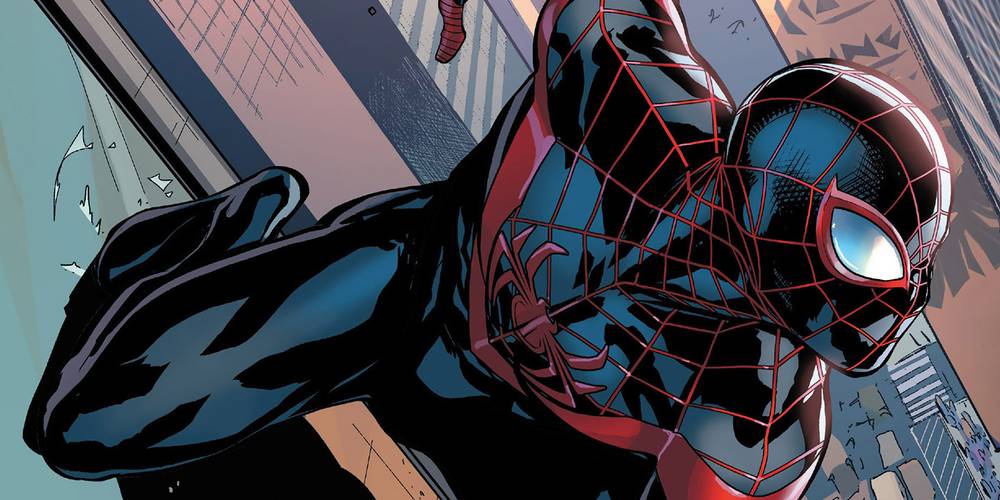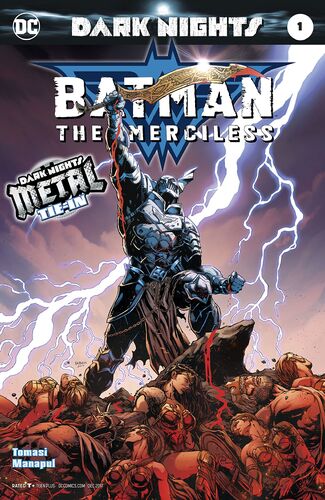Recently, like many of us did, I saw the trailer for the new
animated Spider-Man movie “Into the
 |
| Miles Morales - Spider-Man. |
This approach resonates with me quite well since I started
reading Spider-Man with the onset of the 1990s Clone-Saga event. My first
Spider-Man comic didn’t feature Peter Parker at all, but was the first
appearance of Ben Reilly as the Scarlet Spider (Web of Spider-Man #118) and saw
him facing off against Venom. Peter Parker, to my reading experience, was never
the one true Spider-Man. Perhaps that’s why, even though I enjoyed Spider-Man
comics in my teenage years, Spider-Gwen and Venom are titles that I choose to
read over those featuring Peter Parker. Perhaps that is why I enjoyed Spider-Verse
so much.
 |
| Still grim, still gothic... |
There are other examples of the same logic and implication
being put into place such as Grant Morrison’s Multiversity series, along with his
other works such as Batman: Incorporated. DC’s recently re-christened New Superman and the Justice League of China,
various presentations of Iron Man and Thor as alternate identities, and so on.
Of course, this notion has been deconstructed recently by Scott Snyder in the
Dark Knights Metal event. Herein a variety of different versions of “Batman”
take on the roles, and identity of various superheroes – merging them with his
own gothic-pulp mystique. What is intriguing about the Dark Knights Metal take
on the action of mask-hopping a particular superhero’s costumed identity from
one background to the next is that it reveals the bizarre underpinning of the
trope’s logic. I’m not raising the issue here that Batman could be pushed over
the edge and become a villain (The Batman Who Laughs). That idea has been
explored in a variety of comics already, such as Mark Miller’s Nemesis. Rather,
the implications for iconic examples of non-Anglo-American, Male, superheroes
such as Cyborg or Wonder Woman when their identity is taken up by another
character. Presented under the guises of the Murder Machine (Cyborg/Batman) and
the Merciless (Wonder Woman), the implication that if superhero identity is
exchangeable seems sinister when presenting an African American or female character
self taken up by a wealthy, 1%, Anglo-American male. And sometimes when I think
about that, and the lack of reaction to Batman becoming Wonder Woman in contrast
to Captain America being presented as a Hydra Agent, there are a myriad of
questions in my head. Perhaps it is simply the execution of the storyline – the
presentation of alternate takes on Batman (Dark Knights) versus the idea that Captain
America had always been a Nazi sleeper agent (Secret Empire). And its troubling
to think what this sort of logic would do to a character such as Black Panther
if applied in a similar direction.
I honestly have more questions than answers about this trope,
but what I can say for certain is that it is one that I both adore (Spider-Gwen!)
and despise (the Merciless) on a case-by-case basis…
Dr. Nicholas William Moll is a lecturer and researcher at Federation University Australia and a freelance game designer. His interests include science fiction, tabletop games and literary tropes.
Dr. Nicholas William Moll is a lecturer and researcher at Federation University Australia and a freelance game designer. His interests include science fiction, tabletop games and literary tropes.
Multiversity You: Anyone, Anywho, Anyhow
![Multiversity You: Anyone, Anywho, Anyhow]() Reviewed by Nicholas William Moll
on
Monday, March 05, 2018
Rating:
Reviewed by Nicholas William Moll
on
Monday, March 05, 2018
Rating:



